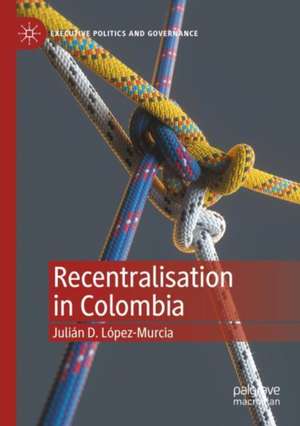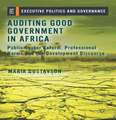Recentralisation in Colombia: Executive Politics and Governance
Autor Julián D. López-Murciaen Limba Engleză Paperback – 6 dec 2022
| Toate formatele și edițiile | Preț | Express |
|---|---|---|
| Paperback (1) | 723.38 lei 6-8 săpt. | |
| Springer International Publishing – 6 dec 2022 | 723.38 lei 6-8 săpt. | |
| Hardback (1) | 728.60 lei 6-8 săpt. | |
| Springer International Publishing – 5 dec 2021 | 728.60 lei 6-8 săpt. |
Preț: 723.38 lei
Preț vechi: 882.17 lei
-18% Nou
Puncte Express: 1085
Preț estimativ în valută:
138.42€ • 144.91$ • 114.53£
138.42€ • 144.91$ • 114.53£
Carte tipărită la comandă
Livrare economică 05-19 aprilie
Preluare comenzi: 021 569.72.76
Specificații
ISBN-13: 9783030816766
ISBN-10: 3030816761
Pagini: 242
Ilustrații: XXIII, 242 p. 17 illus., 3 illus. in color.
Dimensiuni: 148 x 210 mm
Greutate: 0.32 kg
Ediția:1st ed. 2022
Editura: Springer International Publishing
Colecția Palgrave Macmillan
Seria Executive Politics and Governance
Locul publicării:Cham, Switzerland
ISBN-10: 3030816761
Pagini: 242
Ilustrații: XXIII, 242 p. 17 illus., 3 illus. in color.
Dimensiuni: 148 x 210 mm
Greutate: 0.32 kg
Ediția:1st ed. 2022
Editura: Springer International Publishing
Colecția Palgrave Macmillan
Seria Executive Politics and Governance
Locul publicării:Cham, Switzerland
Cuprins
1. Look Whos's Back: Recentralisation in Colombia.- 2. Recentralisation Around the World: Economic, Political and Administrative Explanations.- 3. An Interactive and Cross-Temporal Framework to Explain Recentralisation.- 4. Before the Recentralisation Trend. in Columbia- 5. No Economic Crisis in a Decentralised Context: The Samper Administration (1994–1998).- 6. An Economic Crisis in a Decentralised Context: The Pastrana Administration (1998–2002).- 7. An Economic Boom in a Recentralised Context: The Uribe Administration (2002–2010).- 8. An Economic Boom in a Recentralised Context: The Santos Administration (2010–2018).- 9. An Economic Crisis in a Recentralised Context: The Duque Administration (2018–).- 10. Taking Stock: “Taxonomy”, Heresthetic Strategies, Contributions and Pending Questions.
Recenzii
“López-Murcia’s volume becomes an obligatory reference for those interested in subnational governance and intergovernmental relations in Latin America, as well as for those exploring the evolution of governance processes in the region. Moreover, the book offers readers a clear account of the different tools and bargaining strategies employed by the Colombian elites, beyond the formality of the policy process, to carry forward their agenda. … López-Murcia’s book results very valuable to help us figure out the governance dynamics we will face in the near future.” (Ricardo A. Bello-Gomez, revista.drclas.harvard.edu, July 23, 2022)
Notă biografică
Julián D. López-Murcia is Associate Professor at the Universidad de La Sabana, Colombia.
Textul de pe ultima copertă
“Based on scores of interviews with high-level offi cials across fi ve presidential administrations in Colombia, López-Murcia provides a compelling explanation of recentralisation as the result of interactions between economic performance and institutional context. This is a timely contribution to the literature on multilevel governance.”
—Kent Eaton, University of California, Santa Cruz, USA
“Leveraging within-case variation in economic and institutional variables across fi ve presidencies, the book traces the emergence and success of recentralising coalitions in Colombia. In so doing, it generates important lessons for scholars interested in the determinants of institutional strength and stability, decentralisation and multilevel governance, and Latin American politics.” —Ezequiel González-Ocantos, University of Oxford, UK
“This book will extend and reinvigorate scholarship on decentralization by adding an interactive framework to explain recentralization. Decentralization and intergovernmental relations scholars and practitioners should find this volume worth reading.” —Claudia Avellaneda, Indiana University, Bloomington, USA
This book tackles the question of how to characterise and account for recentralisation in Colombia between central and lower levels of government across a 26-year period. Around the world, the COVID-19 pandemic has once again put the distribution of responsibilities, resources, and authority between different levels of government at the heart of political debate. This book brings this issue to light as a topic central to the study of public administration.Drawing on extensive fi eldwork with more than a hundred interviews with former presidents, ministers, members of congress, governors, local mayors and subnational public offi cials, as well as documentary sources, it begins with a historical account of recentralisation processes in the world. It then proposes a theoretical framework to explain these processes, before tracing and carefully comparing recentralisation episodes in Colombia using theory-guided process tracing.
Julián D. López-Murcia is Associate Professor at the Universidad de La Sabana, Colombia.
—Kent Eaton, University of California, Santa Cruz, USA
“Leveraging within-case variation in economic and institutional variables across fi ve presidencies, the book traces the emergence and success of recentralising coalitions in Colombia. In so doing, it generates important lessons for scholars interested in the determinants of institutional strength and stability, decentralisation and multilevel governance, and Latin American politics.” —Ezequiel González-Ocantos, University of Oxford, UK
“This book will extend and reinvigorate scholarship on decentralization by adding an interactive framework to explain recentralization. Decentralization and intergovernmental relations scholars and practitioners should find this volume worth reading.” —Claudia Avellaneda, Indiana University, Bloomington, USA
This book tackles the question of how to characterise and account for recentralisation in Colombia between central and lower levels of government across a 26-year period. Around the world, the COVID-19 pandemic has once again put the distribution of responsibilities, resources, and authority between different levels of government at the heart of political debate. This book brings this issue to light as a topic central to the study of public administration.Drawing on extensive fi eldwork with more than a hundred interviews with former presidents, ministers, members of congress, governors, local mayors and subnational public offi cials, as well as documentary sources, it begins with a historical account of recentralisation processes in the world. It then proposes a theoretical framework to explain these processes, before tracing and carefully comparing recentralisation episodes in Colombia using theory-guided process tracing.
Julián D. López-Murcia is Associate Professor at the Universidad de La Sabana, Colombia.
Caracteristici
Examines processes of administrative, fiscal and political recentralisation in Colombia Utilises elite interviews with former Presidents of Colombia and other national and local politicians and administrators Provides a template for the study of administrative reform across Latin America














